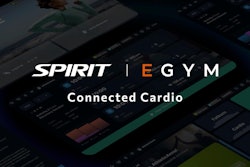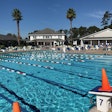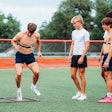Source: PLT4M
Weston, MA, January 12, 2016 — In a world crowded with commercialized training programs, philosophies, and self-proclaimed gurus, how best to improve in a chosen sport is often confusing for young athletes. It is especially confusing when a workout is touted as the key to making an athlete a better football (or basketball, or baseball, etc.) player. No matter the sport, many athletes and their parents are wasting countless dollars for sport-specific training. Why? Sport-specific training doesn’t work. Performance training, on the other hand, does.
What’s the difference?
Sport-specific training, as it has been touted throughout the training world, is a workout regime that is purportedly designed to make an athlete better at, and only at, the specific demands of his or her sport. These workouts claim that by performing just their special blend of exercises, you will become, for example, a better football player. Want the truth? A strength and conditioning training program cannot make you a better football player; it simply cannot be done.
What a good program can do, however, is make you a better athlete and improve your chances of becoming a better player under the direction of your coaches. This is performance training. Sacred Heart University Head strength coach Chris Fee has seen first-hand the improvements to be gained with performance training. “The only way you can become better at a sport is by practicing that sport,” Fee says. “However, you can set yourself up for greater success by priming your body for the demands of athletics in general”. In other words, become a more complete and dynamic athlete, and your potential for success in any sport increases.
This is especially true when it comes to high school athletes. The average high school athlete is not a specialist. He or she plays more than one sport throughout the year and has no formal background in physical training. These athletes are not unique with regard to his or her training needs. They simply need to become better athletes.
Specialization at an early age has proven to be remarkably dangerous. A 2013 study done at the Loyola School of Medicine in Illinois determined that intense training and specialization “is not necessary to achieve elite status”. In fact, specialized training increases the risk of injury by 70-93%, spikes stress and enhances the odds the athlete will quit sports at a young age. The science says young athletes should play multiple sports and develop their bodies in a fundamental way as opposed to specification.
Are there good answers for athletes? Sam Breslin, a trainer and strength specialist in Massachusetts and co-founder of PLT4M.com, says to look for solutions that provide a holistic approach to training. “All athletes benefit from becoming more powerful, more mobile, less prone to injury, and mentally and physically tough enough to compete when the going gets tough”. Breslin suggests an approach like the one provided by PLT4M. Currently training almost 10,000 high school athletes across the country through their online platform, the PLT4M team uses a holistic method of training that works to develop complete athletes.
So whether you are a coach responsible for training your team, a parent looking to help your child, or an athlete yourself, think twice before buying into the sport-specific training myth.
More about PLT4M™
Founded in 2012, PLT4M is changing the way athletes and teams across the country train by making elite training more accessible and affordable. Their online platform delivers personalized workouts for athletes and provides teams with a central training hub where results and attendance can be tracked and analyzed.
Learn more at PLT4M.com





























